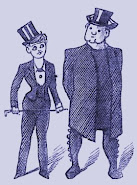 |
| Volume I, No. 1, “For the week ending November 26, 1887” |
◊
July 10, 1886, young Edwin S. Hope of Cardiff, Wales writes to
Young Folks story paper:
“I noticed recently that you apologized for some supposed shortcomings of your illustrations. I trust that you will never alter this style of picture and return to the old woodcuts, whatsoever some of your critics may say. You will be sacrificing vigour to smoothness by such a relapse, and it will be no gain, but a loss. The present style gives us the originality of the artist. The roughest stroke of the pen is eloquent, and the art value of the whole closely approaches that of the etching on copper (which I take to be the highest form of art in black and white). Wood-engraving, with its introduction of so many lines not the work of the artist — smooth, soulless, mechanical lines — is mostly false art. The engraver should never push himself visibly between us and the artist. Zincography is the thing. I hope most sincerely that you will keep to it.”
 |
| ‘Kidnapped,’ illustration by William Boucher, June 5, 1886 |
When young Hope expressed these thoughts on art and reproduction Robert
Louis Stevenson’s
‘Kidnapped; or, the Lad with the Silver Button,’ with accomplished illustrations by
William Boucher, was in serialization in
Young Folks.
 |
| Young Folks, April 10, 1886 |
Edwin S. Hope was a frequent paid contributor of poetry and prose to the Literary Olympic and Tournament section of
Young Folks story paper.
S. Dacre Clarke and
Alfred Harmsworth contributed as well. Harmsworth’s columns on ventriloquism, photography, and bicycles became a continuing feature. The Christmas Double Number contained forty portraits of the chief competitors. No doubt Hope was one of this number as he seems to have favorably impressed the editor of the Letter-Box.
 |
| Boys of the United Kingdom, cover of Complete Volume |
On November 27, 1887, Volume I, Number 1, of Boys of the United Kingdom appeared with the title serial ‘In a Pirate City; or, the White Slave of Tripoli’ by Edwin S. Hope. The proprietor was S. Dacre Clark aka ‘Guy Rayner.’ Hope was reported to be author of ‘The Antelope Mine,’ ‘Heart of Dark Mountain,’ &c. The story was a humdinger and the illustrations were redolent of adventure. It is known that Hope illustrated many of his own stories. Was this his? The artist shows the influence of Funny Folks chief artist William Boucher.
 |
| First page of ‘In a Pirate City’ |
* The Boys of the United Kingdom, ‘For the week ending November 26, 1887’ – April 21, 1888 (22 numbers).
 |
| “For the week ending December 3, 1887” |
 |
| “For the week ending December 10, 1887” |
 |
| “For the week ending December 24, 1887” |
 |
| “For the week ending December 31, 1887” |
 |
| “For the week ending February 18, 1888” |
 |
Left: Comic page by Charles Henry Ross, “For the week ending December 17, 1887”
Right: Xmas Number, “For the week ending December 24, 1887” |




























